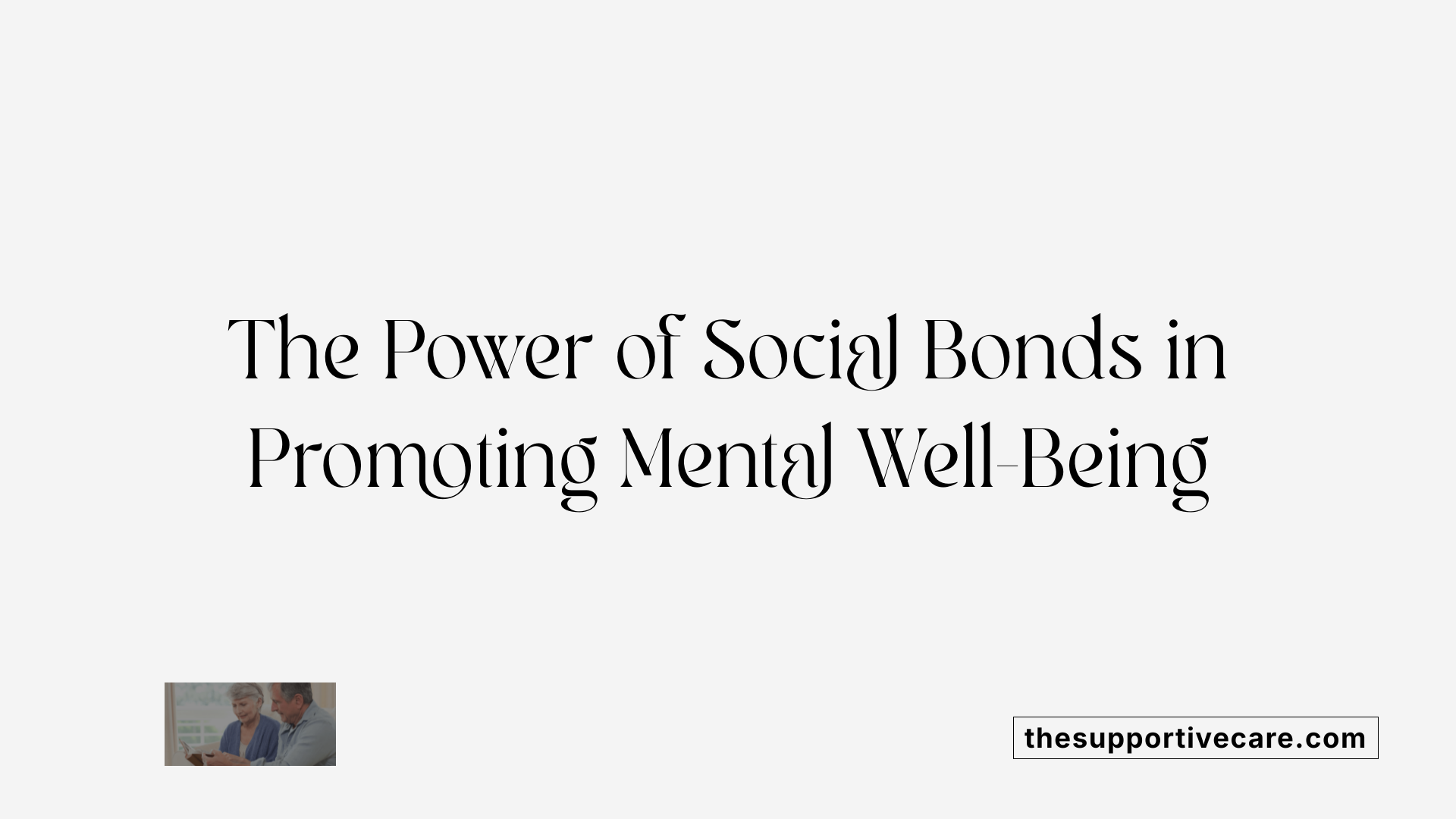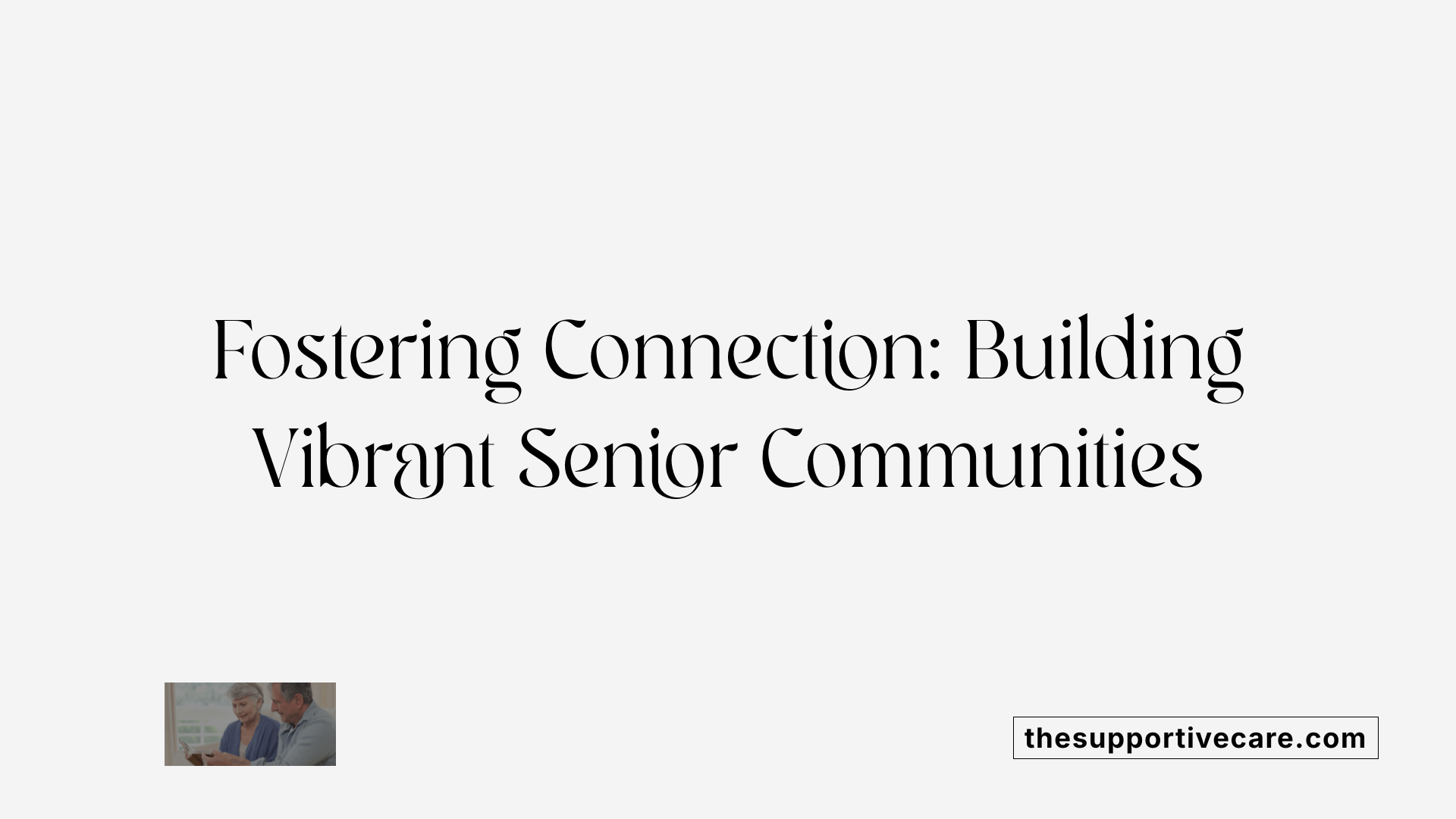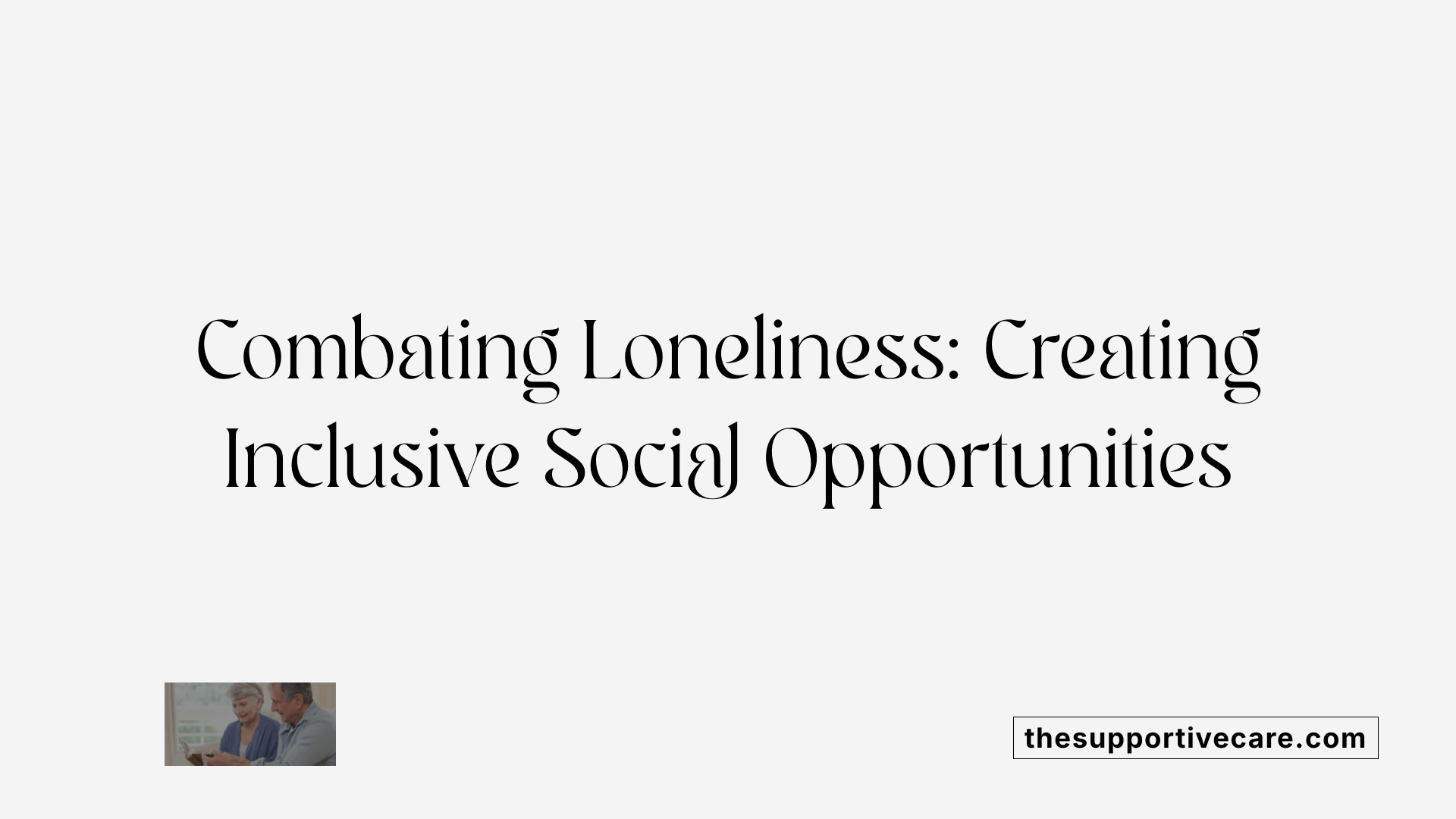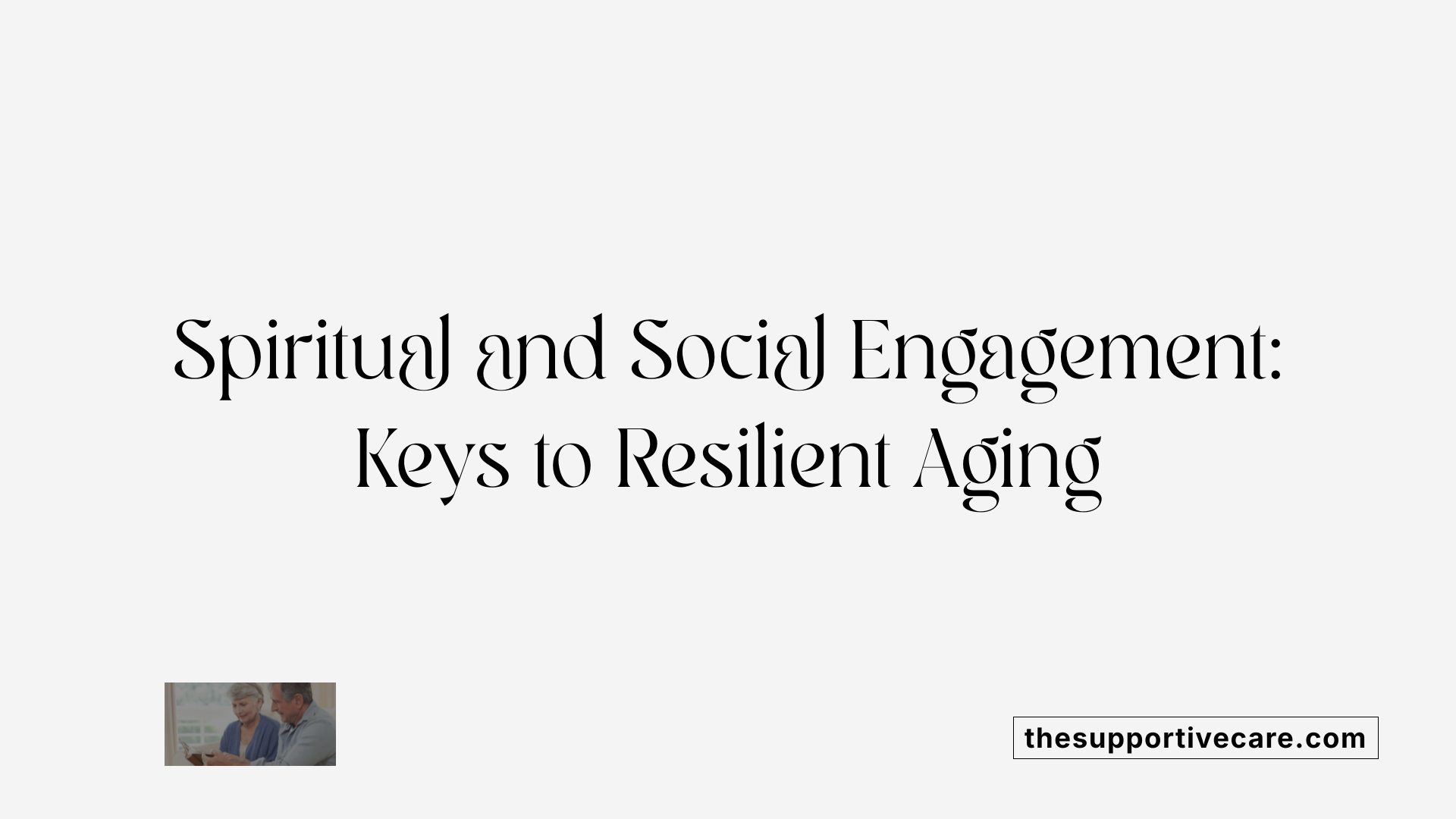Understanding the Critical Role of Social Bonds in Aging
As populations worldwide age, the importance of social connection as a fundamental component of mental health in senior living becomes increasingly evident. Research consistently shows that strong social ties contribute significantly to healthier, more fulfilling lives for older adults, impacting everything from cognitive health to longevity. This article explores the numerous benefits of social engagement, strategies for fostering meaningful relationships, and the vital role these factors play in promoting mental well-being among seniors.
The Significance of Social Connection in Aging and Mental Health

What is the importance of social connections for mental health?
Social connections play a crucial role in maintaining the mental health and well-being of older adults. They foster feelings of belonging, love, and being valued, which are essential for emotional stability.
High-quality relationships offer emotional support that can buffer the adverse effects of stress and reduce symptoms of anxiety and depression. These connections also promote resilience, allowing seniors to better cope with life’s challenges.
Engaging in social activities encourages healthy behaviors such as regular physical exercise, nutritious eating, and good sleep habits. Such activities contribute to overall mental and physical health.
Reducing feelings of loneliness and social isolation is another significant benefit. For seniors, strong social bonds help maintain cognitive function and prevent mental health disorders.
Building and nurturing meaningful relationships can be challenging, especially with health or mobility issues. However, community involvement, group activities, and technology-based communication can strengthen social ties.
Overall, fostering close social relationships is a key social factor that influences a senior’s mental well-being and general health outcomes.
The Impact of Social Engagement on Cognitive and Physical Well-being
How social activity delays cognitive decline and reduces dementia risk
Engaging in social activities is one of the most effective ways to delay cognitive decline and lower the risk of dementia among older adults. Research indicates that seniors with active social lives experience up to a 70% reduction in cognitive deterioration over time. Regular interactions with friends, family, and community groups stimulate brain areas responsible for memory, reasoning, and executive functions.
Participating in cognitive activities such as puzzles, reading, or hobbies alongside social engagement enhances mental agility. These activities not only provide mental stimulation but also foster a sense of purpose and belonging, both of which are vital for cognitive health. Creating opportunities for seniors to join social clubs, volunteer, or engage in group classes can help sustain mental functions longer.
The link between social engagement and reduced inflammation and chronic disease risks
Good social connections have a profound impact on physical health by influencing inflammatory processes in the body. Studies show that seniors with active social lives tend to have lower levels of inflammatory proteins like interleukin-6 and C-reactive protein. Chronic inflammation is associated with various age-related diseases, including Alzheimer's, heart disease, and arthritis.
Healthy social interactions are linked with better immune system functioning, which helps reduce susceptibility to illnesses. Additionally, socially engaged seniors often lead more active lifestyles, which promote cardiovascular health, control blood pressure, and lower the risk of certain cancers and osteoporosis.
Benefits of social participation for physical health, longevity, and mental agility
Staying socially active contributes significantly to longevity. Evidence suggests that seniors involved in social, recreational activities tend to live longer, especially men, with notably reduced mortality rates. Social participation encourages physical movement, which benefits muscle strength, balance, and overall fitness.
Furthermore, social engagement boosts mental agility by stimulating brain networks and promoting neural plasticity. It also improves mood, sleep quality, and emotional resilience, making seniors better equipped to handle stress and physical health challenges.
The advantages extend beyond individual health. Communities that foster social interaction through planned activities, volunteer programs, and accessible public spaces create environments where seniors can thrive physically and mentally.
| Aspect | Impact | Additional Details |
|---|---|---|
| Cognitive health | Delays decline, reduces dementia risk | Active social, cognitive, and physical engagement |
| Inflammation | Lowers inflammatory markers | Reduces risk of chronic diseases such as heart disease and Alzheimer's |
| Physical health | Increases longevity, promotes activity | Encourages exercise, active social routines |
| Mental well-being | Improves mood, reduces depression | Fosters sense of purpose, belonging |
Why are social connections important for seniors' mental health?
Social connections are vital for seniors' mental health because they help reduce feelings of loneliness and depression, which are common in older adults facing life changes and health challenges. Maintaining strong relationships can improve cognitive functioning and provide emotional support, enhancing overall well-being. Social engagement has been linked to better immune function and lower stress levels, contributing to a healthier mind and body.
Additionally, participating in social activities fosters a sense of purpose and belonging, which are crucial for psychological resilience. Therefore, fostering social connections through community involvement, technology, and support services can significantly enhance seniors' mental health and overall quality of life.
By prioritizing social engagement, communities and caregivers can support healthier, more fulfilling lives for older adults, helping them maintain independence and joy in later years.
Strategies and Programs to Strengthen Social Bonds in Senior Communities

What strategies or programs can enhance social connection in senior living communities?
Creating a vibrant social environment in senior housing requires a variety of approaches proven to boost residents' mental and physical well-being. Engaging in community-based activities, such as arts, music, and educational programs, encourages residents to connect over shared interests and learn new skills. These programs foster a sense of purpose and belonging.
Environmental design is another vital component. Inviting common spaces, outdoor gardens, and comfortable lounges create natural opportunities for social interaction. Thoughtful layout and accessible features ensure residents are comfortable gathering, which enhances spontaneous interactions.
Technology plays an increasingly important role in maintaining social bonds, especially when physical contact is limited. Virtual communication tools like video calls, social media platforms, and specialized apps enable residents to stay in touch with family and friends. These tools also support participation in virtual social activities, lectures, and hobby classes.
Intergenerational activities are particularly impactful, fostering relationships between seniors and younger generations through shared projects, storytelling, or mentorship programs. Supporting residents' emotional health with pet therapy and visiting animals can also provide comfort, companionship, and opportunities for social engagement.
Community events such as support groups, themed parties, exercise classes, and cultural activities promote interaction among residents. Coupled with person-centered care and tailored activities, these initiatives ensure that individual preferences and histories are respected, enhancing engagement.
Overall, combining diverse programming, strategic design, technological tools, and personalized care helps strengthen social ties, creating a supportive and lively atmosphere in senior communities.
Addressing Loneliness and Social Isolation in Seniors

How does social connection influence the reduction of loneliness and social isolation among seniors?
Social connection is vital in tackling loneliness and social isolation in older adults. Strong social ties provide emotional comfort and foster a sense of belonging, which are essential for mental well-being. Engaging with others through community groups, intergenerational programs, and social activities helps seniors build and maintain valuable relationships.
Objective social interactions, especially those facilitated through community infrastructure, are effective in creating support networks. These networks not only reduce feelings of loneliness but also improve physical health outcomes, such as lowering the risk of depression, cardiovascular problems, and cognitive decline.
Encouraging active participation—whether face-to-face or via technology—enhances both the quantity and quality of social ties. For example, using digital communication tools enables seniors to stay connected with loved ones and participate in community events remotely.
Research shows that meaningful social connections help increase life satisfaction and resilience in older adults. Better mental health, improved mood, and reduced feelings of loneliness are outcomes linked with stronger social ties.
By promoting accessible and inclusive social opportunities, communities can play a critical role in preventing social isolation. Infrastructure like community centers, transportation services, and organized social programs are essential to support these efforts.
In summary, cultivating robust social relationships and fostering inclusive social environments significantly contribute to healthier, happier, and more connected lives for seniors.
The Role of Social and Spiritual Engagement in Enhancing Mental Health

What role do social and spiritual engagement play in seniors' mental health?
Engagement in social and spiritual activities is vital for maintaining and improving mental health among older adults. Such involvement provides emotional support, helps build a sense of community, and introduces purpose into later stages of life.
Participation in community events, faith groups, and religious practices reduces feelings of loneliness, depression, and anxiety. These activities foster social bonds that serve as buffers against mental health issues, while also encouraging cognitive resilience and emotional stability.
Moreover, being active in social and spiritual spheres enhances overall well-being. It can improve sleep quality, boost physical health, and increase overall satisfaction with life. Through these connections, seniors develop stronger coping strategies and experience a more positive aging process.
How spiritual involvement can foster purpose and resilience
Spiritual activities often bring a sense of purpose and belonging, which are crucial for psychological resilience. Practices like prayer, meditation, or participating in faith-based groups reinforce hope and provide comfort during challenging times.
Spiritual engagement helps seniors find meaning in their experiences and fosters a sense of identity and continuity, which contributes to emotional resilience. It can also encourage a mindset of gratitude and acceptance, further supporting mental health.
Overcoming barriers to participation, such as mobility or technological challenges
Despite the benefits, many seniors face barriers such as limited mobility or difficulty accessing technology, which can hinder participation in social and spiritual activities.
Practical solutions include organizing community programs that are accessible and inclusive, such as home visits or transportation services. Using user-friendly technology and providing digital literacy training can also expand access to virtual faith services, online clubs, or social networks.
By addressing these obstacles, communities can promote greater involvement, helping seniors stay connected and supported.
| Barrier | Solution | Additional Support |
|---|---|---|
| Mobility issues | Accessible community venues, transportation services | Mobility aids, home-based activities |
| Technological challenges | Digital literacy classes, user-friendly devices | Tech support volunteers |
| Health limitations | Customized activities suited to individual needs | Healthcare consultation |
Fostering social and spiritual engagement is essential for healthier, happier aging. When barriers are addressed proactively, seniors can enjoy the many mental health benefits that come with active participation in community and faith-based life.
Understanding the Social Determinants of Health in Aging Populations

How socioeconomic factors influence social connectedness and health outcomes
Socioeconomic conditions such as income, education, and housing play a vital role in shaping the social lives of older adults. Higher income levels often enable seniors to participate in social activities, access community resources, and live in environments that promote social engagement.
Conversely, lower socioeconomic status is associated with increased social isolation, disabilities, and a higher risk of poor health outcomes like depression, cognitive decline, and chronic illnesses.
Education influences awareness and utilization of available social services, while stable housing enhances safety and opportunities for social interaction. These factors collectively impact the ability of seniors to maintain meaningful relationships and engage in community life.
The impact of social cohesion, community support, and access to activities
Strong social bonds and community support are linked to longer, healthier lives for seniors. Social cohesion — the sense of belonging and mutual support within communities — reduces loneliness and promotes a sense of purpose.
Access to diverse social activities, such as group exercises, volunteering, and educational classes, encourages active participation. Engagement in these activities has been shown to improve mood, cognitive function, and physical health.
Supportive environments where seniors feel valued enhance mental well-being and decrease risks of depression and dementia. Regular social interaction fosters emotional resilience, which is essential for aging healthfully.
The importance of policies and neighborhood environments in fostering social inclusion
Public policies and neighborhood designs are crucial in creating inclusive spaces that support social connections. Policies that promote affordable housing, accessible transportation, and community programs help facilitate social participation.
Neighborhood features like parks, community centers, and walkable streets enable older adults to interact with neighbors and participate in local events.
Efforts like intergenerational programs, social support initiatives, and cultural activities are vital policies that promote social cohesion and combat isolation. As such, fostering environments conducive to social inclusion is integral to improving health outcomes for aging populations.
| Aspect | Influence on Aging & Social Health | Additional Notes |
|---|---|---|
| Socioeconomic Status | Determines resource access and social participation | Lower income linked to higher isolation |
| Community Support | Provides emotional and practical assistance | Enhances mental health and sense of belonging |
| Access to Activities | Promotes engagement, cognitive, and physical health | Recreational, educational, volunteer opportunities |
| Neighborhood Environment | Facilitates or hinders social interaction | Walkability, safety, transportation options |
Fostering supportive environments and equitable policies is essential to mitigate disparities and promote social health among older adults. Greater social inclusion leads to better mental and physical health, helping seniors live more vibrant and connected lives.
Prioritizing Social Connection for Better Aging Outcomes
Empirical evidence underscores that fostering social connections in senior living environments is not merely beneficial but essential for promoting mental health, enhancing physical well-being, and supporting a high quality of life for older adults. Strategic interventions, community support, and policy initiatives designed to reduce social isolation and foster engaging, inclusive social environments can dramatically improve health outcomes. As society moves forward, integrating social connection into the core of senior care should be viewed as a vital investment in healthier, more resilient aging populations.
References
- More Than a Feeling: How Social Connection Protects Health in ...
- Social Connection in Long-Term Care Homes: A Scoping Review of ...
- Social Isolation and Loneliness - World Health Organization (WHO)
- How Social Connections Keep Seniors Healthy | Shakopee
- Social Determinants of Health and Older Adults | odphp.health.gov
- The Importance of Connection Amongst Seniors - Priority Life Care
- Building a Strong Social Life for a Healthier Senior Journey


































































































